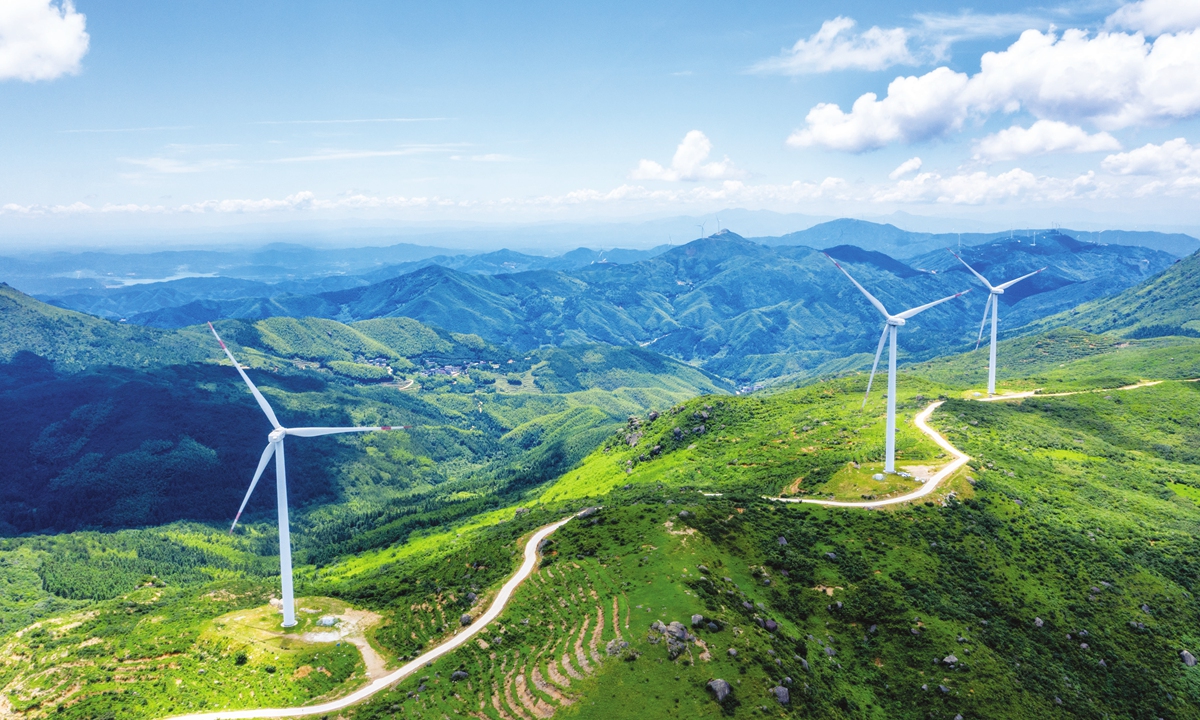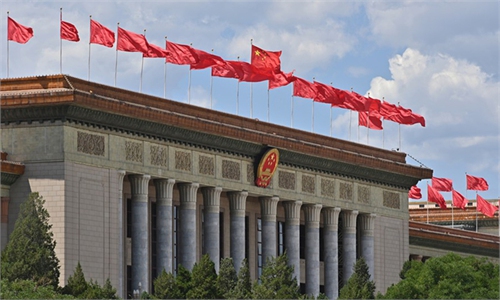TWO SESSIONS 2024 / OPINION
Chinese modernization a major innovation in theory, practice of global modernization

Photo:VCG
Editor's Note:China's annual two sessions have begun this week. This critical series of meetings in spring is vital to defining China's approach to economic, political and foreign policy issues for the whole year. It also offers observers a window into the latest ideas and practices of China's development in various aspects, including the whole-process people's democracy, high-quality development, Chinese modernization and the wisdom the country provides to global governance.
In the fourth piece of the series "Two sessions inspirations," Giancarlo Elia Valori (Valori), an Italian expert on international affairs and Honorary Professor at the Peking University, shared his insights with the Global Times (GT) on the connotations of China's high-quality development and the inspirations Chinese modernization provides to other developing countries.
GT: How do you view the significance of the two sessions in China and the decisions to be made during the event?
Valori: Promoting modernization is the major achievement behind China's national plans. Therefore, the two sessions are an opportunity to better discuss insights and ideas for the future general framework and for the practical direction of these new endeavors, by emphasizing that modernization is the guide and that governments at all levels should focus on these goals.
China is a large country with over 1.4 billion inhabitants. Modernization with a huge population aims at the common prosperity of all Chinese ethnic groups and people. Faced with the contradiction between people's growing need for a better life and unbalanced and inadequate development, it is necessary to make full use of the advantages of the socialist system with Chinese characteristics and use them to forge broader social trust and strength in contemporary China.
Since the 18th National Congress of the Communist Party of China held in 2012, the CPC Central Committee, with Xi Jinping at its core, has led the country in stabilizing the economy and promoting development. It has also been fighting poverty, controlling epidemics, avoiding major disasters, responding to situations and resolving crises. The national effort has achieved results and historic changes, successfully promoting and expanding the stages of modernization.
The important task of the two sessions is, therefore, to ensure that the ideas recently expressed by the leadership become the will and common action of the country and people through legal procedures, based on the primary tasks and careful planning of high-quality development.
GT: China has always put "high-quality development" at the top of the governance agenda. How do you see the pursuit of "high-quality development" in the Chinese economy? How do you interpret its specific connotations?
Valori: The development of new quality productive forces was proposed by Chinese President Xi Jinping in September 2023. The state of advanced productivity, in which innovation plays a leading role, is fundamental to promoting high-level scientific and technological self-sufficiency.
Continuing to improve people's lives, well-being and social happiness is the ultimate goal of promoting high-quality development. The more severe and complex the economy is, the more important it is to focus on the livelihood problems of citizens and to secure their basic means of subsistence. I believe that this year's two sessions will still focus on rural revitalization and farmers' livelihood, particularly on increasing industrial support for rural areas.
Last year, in accordance with new requirements to comprehensively deepen reforms in the promotion of Chinese modernization, a series of important reform measures provided momentum and vitality. Problems related to urgent needs for high-quality development and the issues that people were anxiously waiting to be tackled were solved. This is because the Chinese leadership generally believes that reform measures should continue to be implemented to expand domestic demand, optimize the structure, increase confidence, ensure people's livelihoods, prevent risks and focus on solving the most critical and urgent problems.
GT: In a period of global economic turbulence, what contribution does China's high-quality development model make to the stability of the world economy? What inspirations can developing countries draw from China's development model?
Valori: Chinese modernization is a major innovation in the theory and practice of global modernization. There is neither a single model of modernization nor a universally applicable standard of modernization in the world. For a long time, some countries have monopolized the modernization discourse and adhered to the "Western-centric theory," supported the so-called Washington Consensus and continuously amplified the illusion that "modernization is Westernization" and that "Western civilization is modern civilization," the perfect one where everyone is good and the bad is on the other side. Some of the major Western countries claim they have the most developed economy and the most advanced technology in the world. But they have the most severe polarization between rich and poor and record the highest number of work-related deaths. Acts of revenge and social divisions have deepened to unprecedented levels.
China's view of the world, values, history, civilization, popular and socialist democracy, ecology, as well as its great practices contained in Chinese modernization, explode the myth of "modernization is Westernization" and abandon the Western capital-centered model. China is not only practicing modernization, but also embarking on its own innovative path to overcome the mistakes and shortcomings of Western-style modernization. The Chinese modernization model provides a solution for human society to achieve long-term peace and stability, eradicate extreme poverty, promote common development and respond to challenges such as climate change.
The Chinese-style high-quality development model offers a new choice to developing countries. The states that were once called Third and Fourth World States have the right and the ability to independently explore their own unique paths to modernization according to their own national conditions. For a while, some of these countries were under the illusion that they were "learning from the West" and copying Western models. As a result, they were obviously unable to adapt and as a consequence they fell into a quagmire of long-term stagnation in development and social situation, resulting in political instability.
China has created a miracle of long-term fast economic and social development, which has brought stability and profoundly changed the development process in world history. The World Bank report pointed out that from 2013 to 2021, China's average contribution rate to world economic growth reached 38.6 percent, exceeding the combined contribution rate of the G7 countries. Hence, the successful practice of Chinese-style high-quality development has given developing countries new hope and choices, triggering a wave of "learning from China."
GT: On Tuesday, China set its 2024 economic growth target at around 5 percent. China has long been a driving force in the world economic recovery, will this trend continue in 2024?
Valori: I would like to quote the International Monetary Fund (IMF), which has recently raised its growth forecasts for the Chinese economy and emerging Asian economies in 2024. At the same time, based on the resilient growth of major economies such as China, the IMF has raised its global economic growth forecasts for this year by 0.2 percentage points to 3.1 percent. The IMF has emphasized that the upward revision of China's economic growth forecasts reflects the continuation of the Chinese economy's higher-than-expected growth momentum last year and the driving role of the Chinese government's relevant policies.
The IMF stated in its latest World Economic Outlook Report that global economic growth is likely to see a further upward trend in 2024. Key factors include the acceleration of China's economic recovery.
Optimistic expectations for economic growth in China have also boosted confidence in regional economic growth. The IMF forecasts that, as economic growth in China may exceed expectations, the overall economic growth rate of emerging economies in Asia is expected to reach 5.2 percent this year, 0.4 percentage points higher than forecast in October last year.
Besides the IMF, international financial institutions such as Goldman Sachs and UBS Group AG (a Swiss financial services company based in Zurich and Basel), have recently published reports stating that China's consumption and service sectors will continue their post-pandemic recovery trend in 2024. The UK's Economist Intelligence Unit and others also predict that China's economic fundamentals will be stronger in 2024.
Sonali Jain-Chandra, Head of the IMF delegation to China for the Article IV Consultation Report, told journalists that the policies implemented by the Chinese government would have a positive impact on the economy, adding that IMF-related research shows that each percentage point of economic growth in China would push other countries' economic growth up by 0.3 percentage points. She believes that China's economic growth will still be higher than the global average in 2024 and that China will be the largest contributor to global economic growth in 2024.
This is enough to have confidence in this prospect.

